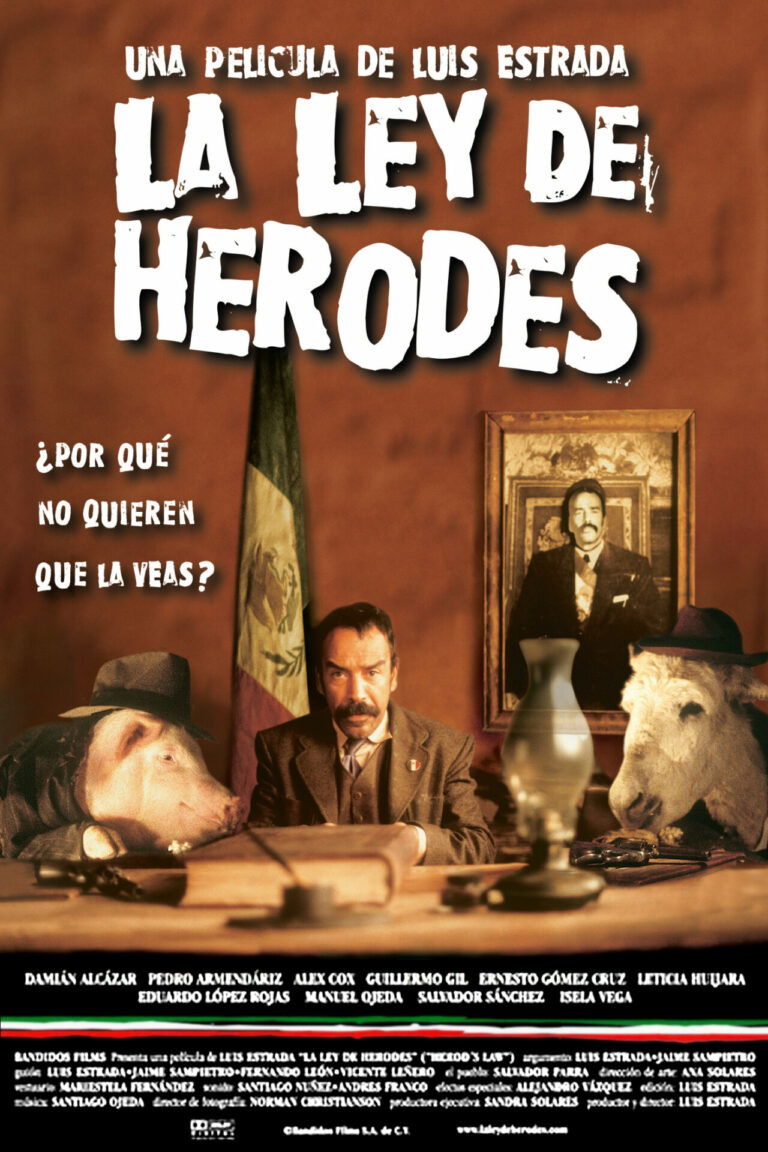
| None | Light | Moderate | Heavy | |
|---|---|---|---|---|
| Language | ||||
| Violence | ||||
| Sex | ||||
| Nudity |
Content:
(HHH, ABABAB, LLL, VVV, SSS, NN, AA, D, MMM) Very strong humanist worldview with a very strong anti-clergy portrayal; 102 obscenities, two light profanities, and man urinates on enemy’s grave; very strong violence, more disturbing than bloody, includes pointblank political assassinations, implied decapitation, man slits another man’s throat, man beats up town mayor, and unfaithful man beats his wife and chains her up when she cheats on him; depicted fornication, depicted adultery, and depicted prostitution; upper and rear male and female nudity; alcohol use and drunkenness; smoking; and political corruption, extortion, bribery, hypocrisy, and bearing false witness.
GENRE: Satire
HHH
AbAbAb
LLL
VVV
SSS
NN
AA
D
MMM
More Detail:
HEROD’S LAW is said to be the movie that helped bring down the ruling party in Mexico, PRI, in 2000. Indeed, it is a vicious satire of the political and social corruption that has insidiously grabbed hold of many parts of that country south of the border. It’s way over the top, however, and it contains lots of crude language, disturbing violence, and graphic sexual situations. Adding insult to injury, the only clergyman depicted in the movie is a Roman Catholic priest who takes bribes, engages in spiritual and political extortion, and says that the local brothel in a small isolated village provides a positive social function for the community.
Set in 1949, the movie opens with a political boss named Lopez, who’s working for an ex-general running for governor, suffering a minor crisis in a small isolated Indian village called San Pedro. The villagers have just killed their third mayor in five years, and Lopez needs someone to keep them quiet until after the election. Lopez appoints Juan Vargas, a naïve, not-too-bright, unkempt minor official, to be the new mayor.
To their chagrin, Juan and his beautiful wife, Gloria, discover that San Pedro is a very tiny backwater town whose most successful business is the local house of prostitution. Juan also discovers that the last mayor, who was beheaded with a machete, left no money in the treasury. With the opposition party leader demanding reforms, Juan decides to go back to Lopez and ask for more money. Juan actually believes the propaganda of his party’s alleged commitment to “modernity and social justice.”
When he gets to Lopez, however, Lopez gives him a gun and a Mexican law book. He tells Juan to go back to San Pedro and get the money he needs by taxes, fees, and fines. Lopez also tells Juan about Herod’s Law, which, cleaned up for our readers, means, “Do unto others before they do unto you.”
Armed with his new authority, Juan returns to San Pedro and begins enforcing the laws. The money starts flowing into San Pedro’s treasury, but it corrupts Juan and his wife. Juan starts taking bribes, including enjoying the services of the prostitutes in the local brothel. When the woman running the brothel fights back by hiring a thug to beat him up, however, Juan murders both her and the thug, and frames the local leader of the opposing party. More murder and corruption ensues.
Only just released in the United States, HEROD’S LAW is an all-out attack on the PRI, the socialist political party that ruled Mexico for so many years. No doubt, officials from PRI probably were involved in the kind of murder and political corruption depicted in the movie, but the character of Juan takes those things to such a high degree that some viewers might not find the story believable. They should remember, however, that many dictators like Juan Vargas have in actual fact become so brutal and corrupt. One need only think of such dictators as Adolph Hitler, Joe Stalin, and Saddam Hussein to know that this is indeed the case. The comical tone of HEROD’S LAW, however, and its outrageous characterizations take the edge off the story and may actually contribute to the movie’s lack of believability.
At any rate, although HEROD’S LAW succeeds in exposing the corruption of a country which was ruled by one party for so long, it shows little restraint in depicting the foul language and sexual immorality in its story. Also, the Roman Catholic priest in San Pedro is nearly just as corrupt and hypocritical as Juan becomes. There is no positive Christian content to refute this depiction of a bad religious leader. Finally, although HEROD’S LAW is not a gory movie, its violence is very strong and disturbing. Juan commits several point-blank political assassinations. Furthermore, although he cheats on his wife, he beats his wife when she finally cheats on him.
Thus, despite making a good argument against high taxes, the depiction of political, religious, and sexual corruption in HEROD’S LAW is ultimately a humanistic depiction. The movie effectively skewers Mexico’s political and religious leaders, but it offers nothing positive to counterbalance those negative portrayals. Compare this with a political satire like the brilliant DR. STRANGELOVE, where at least you have Peter Sellers’ positive depiction of the earnest, morally upright British officer, Mandrake, who tries to stop the nuclear mayhem that eventually occurs in that movie.
Please address your comments to:
No address available.
SUMMARY: HEROD’S LAW, a political satire from Mexico, tells how that country’s political and social corruption envelopes a minor, not-too-bright bureaucrat, who becomes more adept at bribery and murder than the leaders in his party. Although HEROD’S LAW succeeds in exposing the corruption of a nation ruled by one political party for so long, its humanist worldview shows little restraint in depicting foul language, sexual immorality, and religious corruption.
Set in 1949, the movie opens with a political boss named Lopez, who’s working for an ex-general running for governor, suffering a minor crisis in a small isolated Indian village called San Pedro. The villagers have just killed their third mayor in five years, and Lopez needs someone to keep them quiet until after the election. Lopez appoints Juan Vargas, a naïve, not-too-bright, unkempt minor official, to be the new mayor.
To their chagrin, Juan and his beautiful wife, Gloria, discover that San Pedro is a very tiny backwater town whose most successful business is the local house of prostitution. Juan also discovers that the last mayor, who was beheaded with a machete, left no money in the treasury. With the opposition party leader demanding reforms, Juan decides to go back to Lopez and ask for more money. Juan actually believes the propaganda of his party’s alleged commitment to “modernity and social justice.”
When he gets to Lopez, however, Lopez gives him a gun and a Mexican law book. He tells Juan to go back to San Pedro and get the money he needs by taxes, fees, and fines. Lopez also tells Juan about Herod’s Law, which, cleaned up for our readers, means, “Do unto others before they do unto you.”
Armed with his new authority, Juan returns to San Pedro and begins enforcing the laws. The money starts flowing into San Pedro’s treasury, but it corrupts Juan and his wife. Juan starts taking bribes, including enjoying the services of the prostitutes in the local brothel. When the woman running the brothel fights back by hiring a thug to beat him up, however, Juan murders both her and the thug, and frames the local leader of the opposing party. More murder and corruption ensues.
Only just released in the United States, HEROD’S LAW is an all-out attack on the PRI, the socialist political party that ruled Mexico for so many years. No doubt, officials from PRI probably were involved in the kind of murder and political corruption depicted in the movie, but the character of Juan takes those things to such a high degree that some viewers might not find the story believable. They should remember, however, that many dictators like Juan Vargas have in actual fact become so brutal and corrupt. One need only think of such dictators as Adolph Hitler, Joe Stalin, and Saddam Hussein to know that this is indeed the case. The comical tone of HEROD’S LAW, however, and its outrageous characterizations take the edge off the story and may actually contribute to the movie’s lack of believability.
At any rate, although HEROD’S LAW succeeds in exposing the corruption of a country which was ruled by one party for so long, it shows little restraint in depicting the foul language and sexual immorality in its story. Also, the Roman Catholic priest in San Pedro is nearly just as corrupt and hypocritical as Juan becomes. There is no positive Christian content to refute this depiction of a bad religious leader. Finally, although HEROD’S LAW is not a gory movie, its violence is very strong and disturbing. Juan commits several point-blank political assassinations. Furthermore, although he cheats on his wife, he beats his wife when she finally cheats on him.
Thus, despite making a good argument against high taxes, the depiction of political, religious, and sexual corruption in HEROD’S LAW is ultimately a humanistic depiction. The movie effectively skewers Mexico’s political and religious leaders, but it offers nothing positive to counterbalance those negative portrayals. Compare this with a political satire like the brilliant DR. STRANGELOVE, where at least you have Peter Sellers’ positive depiction of the earnest, morally upright British officer, Mandrake, who tries to stop the nuclear mayhem that eventually occurs in that movie.
Please address your comments to:
No address available.
SUMMARY: HEROD’S LAW, a political satire from Mexico, tells how that country’s political and social corruption envelopes a minor, not-too-bright bureaucrat, who becomes more adept at bribery and murder than the leaders in his party. Although HEROD’S LAW succeeds in exposing the corruption of a nation ruled by one political party for so long, its humanist worldview shows little restraint in depicting foul language, sexual immorality, and religious corruption.


 - Content:
- Content: 

